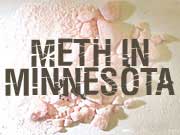April 18, 2005
 |
| The restrictions at Target apply to all over-the-counter drugs containing pseudoephedrine, including children's medicines, tablets, liquids and gel-caps, spokeswoman Carolyn Brookter said. Pseudoephedrine is a key ingredient for meth made in makeshift labs. (File photo) |
St. Paul, Minn. — In two or three months, anyone who takes Sudafed or NyQuil or Claritin D won't be able to run into Target, grab the medicine off the shelf and pay for it at the checkout counter. Instead, they'll have to buy the drugs at the pharmacy counter.
Target spokeswoman Carolyn Brookter says the decision is based on two things. First, they hope putting the medicine in question behind pharmacy counters will deter meth cooks from buying the main ingredient at their stores.
The other factor is based on public policy. Lawmakers in Minnesota and other states want to pass or have passed laws requiring retailers to place the packages behind the counter. Brookter says Target wants to keep its policy consistent nationwide.
"This is the right step to take in helping to be part of the solution against the meth epidemic. We certainly hope other retailers follow suit, but it will be up them," she said.
Brookter says Target will also continue to limit the sale of the medicine. Customers will only be able to buy two packages per transaction.
Those in law enforcement are praising Target's decision.
Minnesota Commissioner of Public Safety Michael Campion says states that restrict sales of drugs containing pseudoephedrine are seeing a decrease in meth labs. He says Oklahoma has seen an 80-percent decrease in meth labs since that state passed a law similar to the new Target policy.
"No pseudoephedrine, no methamphetamine. It's quite frankly that simple. That is the ingredient to make meth. The molecular structure is so close; that is the product that one needs to make methamphetamine in a clandestine laboratory," according to Campion.
Campion says despite Target's move, he'll continue to push for tougher meth laws in Minnesota. He says it's important for retailers to log every purchase of these potential meth-making products. A record of such transactions could scare away meth-makers. Target officials say they only intend to keep an electronic log of purchases in states that currently require it.
Sen. Julie Rosen, R-Fairmont, says she'll continue to push for the legislation to become law. She is the author of the meth bill in the Senate. Her bill restricts pseudoephedrine sales and increases penalties for those who manufacture and sell meth.
Rosen says Target is doing the right thing. She says her bill would require others to follow Target's lead.
"We also have to make sure that we not only get the big chains to follow but also the small mom-and-pop chains," she says. "That's probably where we have the most infractions. People go into the convenience stores or into the small drug stores and they can be thrifty about how they're going to get their pseudoephedrine product."
Meanwhile, Target officials say the 300 Target stores that don't have a pharmacy won't sell the any of the drugs in question. A spokeswoman for the nation's largest retailer, Wal-Mart, say the company is evaluating its policy and will look at the best alternatives for its customers. Wal-mart limits the sale of the same products to three packages per transaction.





